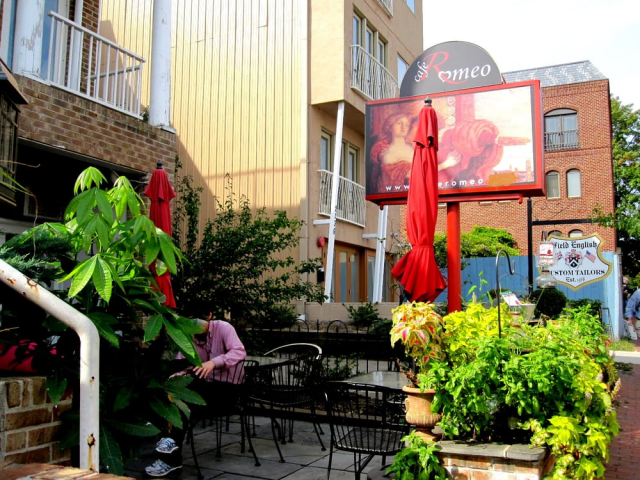
The D.C. Department of Health ordered the shutdown of Glover Park pizza shop and hookah lounge Cafe Romeo’s Sept. 24 due to a vermin infestation and other health code violations.
The restaurant’s unsanitary conditions and rodent problems were the most significant violations of the D.C. Food Code. The D.C. Department of Consumer and Regulatory Affairs also ordered that the owners of Cafe Romeo’s vacate the building because of structural dangers, including extensive electrical issues.
Cafe Romeo’s closure will likely be temporary, however, according to D.C. Department of Health Public Affairs Specialist Alison Reeves.
“Cafe Romeo’s will be reopened once they pass their restoration inspection, after they have corrected all the violations marked on their inspection report,” Reeves wrote in an email with The Hoya.
Cafe Romeo’s has been at its 2132 Wisconsin Ave. NW location for over 15 years, according to its website.
This is not the restaurant’s first health code violation, according to the D.C. Department of Health. The D.C. Health Regulation and Licensing Administration has filed eight complaints against Cafe Romeo’s since November 2008. Several complaints reported unclean food contact surfaces, improper handling of food and the lack of necessary sanitary equipment and procedures.
The owner of Cafe Romeo’s, Davar Ashgrizzadeh, declined to comment.
Cafe Romeo’s pest problems, however, are not an isolated incident in the Georgetown area. Georgetown restaurant Moby Dick House of Kabob experienced a rodent infestation this past summer. The restaurant’s rat problems were revealed by a video posted online by FOX 5 DC on July 23 that caught several rats on camera within the establishment.
Moby Dick was closed for over three weeks for the restaurant’s management to tackle the issue. After several structural changes were made to the building in order to combat the rat problem, Moby Dick reopened and has not experienced any more rodent visitors since.
These occurrences highlight the issues faced by the larger Georgetown community when it comes to pests. Almost every restaurant and vendor in the Georgetown area deals with rats on a daily basis, according to Moby Dick’s Chief Development Officer Alex Momeni.
“It’s a day-to-day struggle out in Georgetown,” Momeni said in an interview with The Hoya.
Rodents are a daunting problem for restaurants and homes across Washington, D.C. The neighborhoods of Columbia Heights, Park View and Bloomingdale reported the highest numbers of rat complaints made to the District’s 311 service request number in recent months. In 2018, D.C. received more than 6,000 rat complaints from the 311 line, an increase from the 5,000 calls it received in 2017.
Momeni argued that Georgetown’s location next to the Potomac River provides a comfortable area for rodents.
“Georgetown in particular happens to be near the water,” Momeni said. “And from what we’re gathering, it’s a very comfortable, resort-type situation for these things.”
A Whole Foods in Glover Park shuttered in March 2017 after experiencing a massive rodent and bug infestation. Although the grocery store intended to manage the pest problem, renovate and eventually reopen, a dispute with the landlord prevented Whole Foods’ return, according to Washington Business Journal. The store broke its lease by closing for over 60 days because of the health code violations, ultimately leading to its demise.
As chronicled on the popular Instagram page @georgetown.hotmess, rats, dead and alive, are frequently seen around Georgetown University’s campus, including in Leo O’Donovan Dining Hall. A rat was spotted crawling on bags of potato chips in Wisemiller’s Deli in October 2017, and students circulated the resulting video around Facebook.
The city’s government has made several efforts during the past few years to effectively end the rodent problem, including a recent push for the administration of rat birth control. Other efforts include the use of dry ice and solar trash cans.
In order to combat pest issues in the Georgetown community, Momeni suggested that local restaurants with rat problems should consider temporarily closing down.
“If they can financially afford it, they should really consider potentially closing up for a few days or a week or two,” Momeni said. “And to do exactly what we did because it just seems to work really nicely for us.”
Momeni stressed the importance of government and community action when it comes to Georgetown’s rodent problem.
“The good news is I know the D.C. mayor and the entire political scene out there is aware of this problem,” Momeni said. “They’re constantly coming up with new programs to help businesses combat this. I’m just hoping and praying they continue escalating their level of involvement and teaming up with businesses in the area and hopefully together we can start pushing these friendly neighbors out of the way.”




















